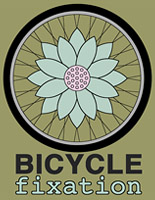Maybe 35 miles, mostly quite flat, mostly (but not entirely) quiet roads.
- Meet at 9:30 at Massimo's Mudspot on La Brea and 8th in the Miracle Mile for coffee and yakking.
- Roll around 10:00 for a saunter through Beverly Hills to Century City and eventually Brentwood, where we'll ascend the westside roadies' stairway to heaven, San Vicente Boulevard! (No actual climbing involved, except for half a block of Federal Way.)
- Stop at Caffe Luxxe for more coffee and yakking and my Birthday Croissant (unless they're out of it....)
- Onward through the leafy environs of San Vicente to the Palisades, where we'll decide whether to ride roads or path southward, with the goal of ending up in Marina del Rey, with a possible detour to The Bridge.
- Eastwards along the Ballona Creek bike path to the longitude of Samosa House East for more refreshment.
- Back to the Mile via various neighborhood backroads for the most part.
RSVP (via our Comments page) would be nice but not required; just show up and ride (and eat) along!
And we will be CVC compliant.
Moderate pace, might be a small or big group, but good friendly folks in any case.
Note: Massimo's is two or three miles west of the Wilshire/Western Red Line station, and right on the 212, 20, and 720 bus lines. There is some street parking around for those who drive. Map on Massimo's website website linked above.
Richard Risemberg on Fri, 26 Feb 2010 20:50:21 -0800 [link]
- Quality of Labor
Even our ragtrade colleagues who most fervently support outsourced production constantly remark on how well-sewn our garments are. Happier workers are generally better workers, and struggling long hours for little pay does not make one happy. - Quality of Materials
While some Chinese fabrics are indeed very good (we have used Chinese hemp blends), the gabardine samples I have been given by those same colleagues were nowhere near the quality we wish to present to our customers. - Environmental Costs
While China has been improving its environmental policies in the last year and a half, it still has a very long way to go--and nothing China does within its borders will lessen the impact of shipping finished products across the ocean. We do use imported textiles when we can't find local product, but bulk shipping is far more efficient than the shipping of the same cloth made into finished and packaged goods. - Support of the Local Economy
To keep money and materials circulating locally improves the social and environmental health of the city and region that supports us, as well as its money economy.
From an LA Times article by David Pierson and Barbara Demick:
China's rapid rise might be the envy of nations across the globe. Yet for all the talk of its economic miracle, Chinese consumers are taking home a shrinking share of the pie. In the 1990s, household income accounted for 72% of the country's gross domestic product. By 2007 it had fallen to 55%, according to a study on Chinese consumption by consulting firm McKinsey & Co.Nothing against China; we even have collateral relatives there. But outsourcing our production to the PRC--or any other similar country whose main export is not really goods but depressed labor costs--would do neither their workers nor ours any favors, but only support yet another level of predatory bosses. We choose not to do that, though it costs us a bit of cash.
That's because Beijing has geared China's economy toward production rather than consumption. It's a formula that has provided millions of workers with employment but no quick path to the middle class.
Driving the disparity, experts said, is China's decision to subsidize manufacturing and exports at almost any cost to keep its factories humming. The government has showered its manufacturers with low-interest loans, export subsidies and other incentives to give them an edge over foreign competitors. Beijing has also kept its currency, the yuan, artificially low so that its goods remain cheap abroad.
That has been a boon for Chinese factory owners and other well-connected elites. The nation boasted 42 billionaires on Forbes' most recent list of global tycoons.
But wages for most Chinese workers have grown slowly, while their tax burden has risen to help finance all those business subsidies. Meanwhile, a weak currency has fueled inflation and makes imports more expensive for consumers at home.
The McKinsey study said the average Chinese worker has to put in seven hours on the job to earn enough to purchase the same amount of goods or services that an American worker could buy with one hour's pay.
And the money Bicycle Fixation pays out to local labor is, much of it, spent in local businesses--including those that support the very people buying our goods.
As the poet William Wordsworth wrote:
The world is too much with us; late and soon,Those who see cheapness as the only virtue, in spite of the damage it may cause their fellow humans and the earth itself, have certainly given away their hearts.
Getting and spending, we lay waste our powers;
Little we see in Nature that is ours;
We have given our hearts away, a sordid boon!
Richard Risemberg on Mon, 22 Feb 2010 11:45:50 -0800 [link]
We met at the Wilshire/Vermont Metro station and headed due south on Vermont, passing the storefront churches, auto body shops, and, on this brisk Sunday, several open-air barbecue enterprises--and also past USC and the former digs of Pepperdine College, which was down by Florence and Vermont when I attended it. Our goal was Imperial Highway, which wound through Watts, Compton, and Lynwood to the Los Angeles River several miles east.
Once on the river path we fought a nearly brutal headwind to Anaheim Street, then skirting the foothills of horsey Palos Verdes till we came to the coast. A quick lunch stop at hermosa Beach, and we charged back northwards (the wind had turned so it was still ahead) to the Ballona Creek bike path, where we finally were permitted a tailwind for the last few miles home.
Here are a few scenics of the river, the harbor area, and the beach...photos of the crew (and many more photos of the route; practically everyone had a camera) should show up on the group's Flickr page soon.
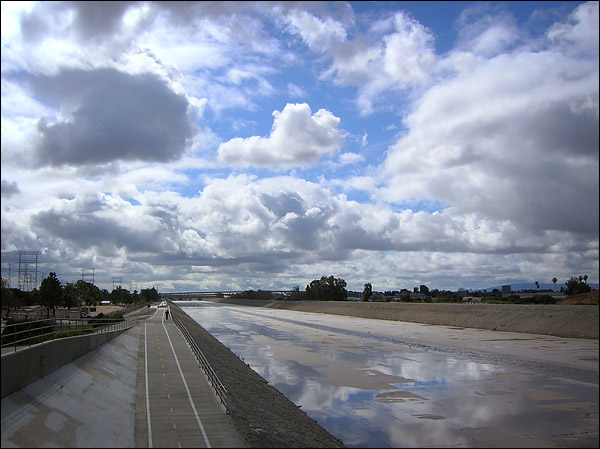
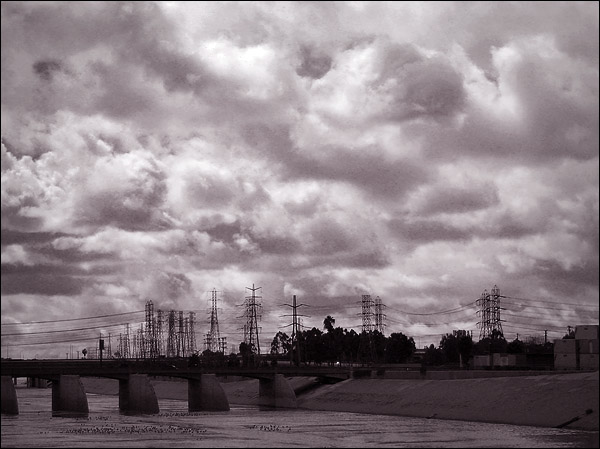
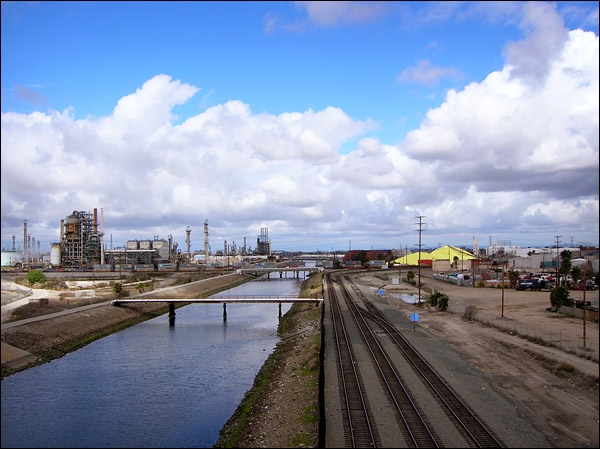
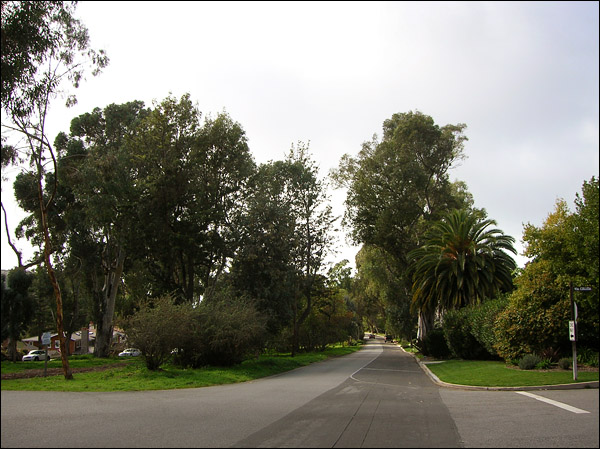
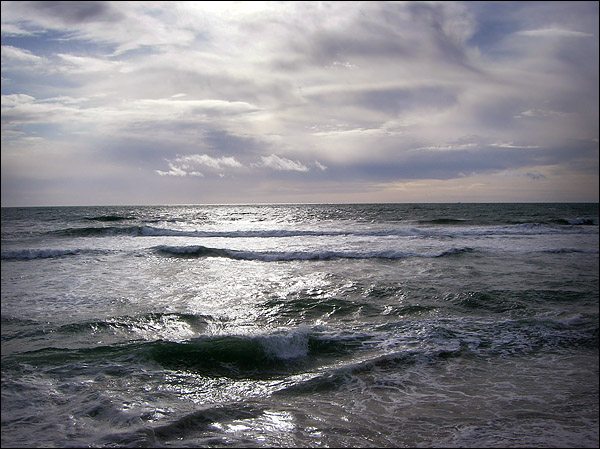
I should have brought more food, and put my wind shell on sooner, as the cold affected me a bit, but a great ride nevertheless.
Richard Risemberg on Sun, 21 Feb 2010 22:26:44 -0800 [link]
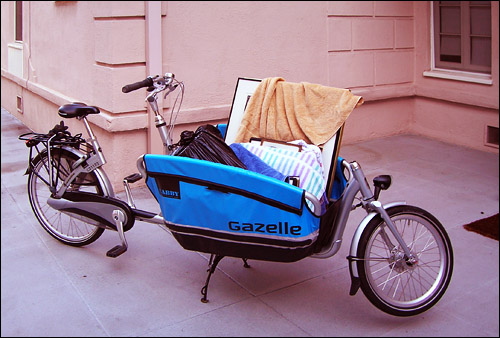
Those frames had glass, and the roads here are bumpy, but (with the help of some old towels for padding) the Cabby carried them safely home.
While by no means a zippy bike, it's remarkably easy to handle even loaded up. Keep your eye on this blog for an announcement of the full report, once we've put the thing through its paces.
Richard Risemberg on Sat, 20 Feb 2010 12:25:57 -0800 [link]
The atmosphere created by bicycle boulevards is one that is inviting to bicyclists, pedestrians, and all users of the road alike. Neighbors can once again enjoy their streets together, no longer threatened by speeding automobiles--with some through car traffic diverted, the drivers that do use the streets are your neighbors, traveling at neighborly speeds. Residents can reclaim a landscape that has in the last few decades been almost entirely usurped by the car: in most western US cities pavement has covered up to 70% of the urban landscape. With bicycle boulevards there are opportunities to have more trees, permeable pavement, traffic circles, mini-parks and other amenities.Read more on the LACBC website, where there's also an email link to Dorothy Le, in case you want to lend a hand.
Portland, Berkeley, Long Beach, and a bunch of other US cities have already beat LA to the punch; it's our turn now!
Richard Risemberg on Thu, 18 Feb 2010 16:42:33 -0800 [link]
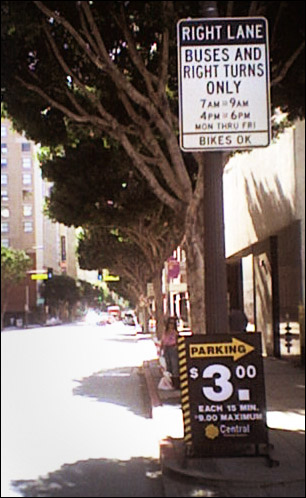 There has been a proposal floating around to implement a rush-hour bus-only lane on madly-congested Wilshire Boulevard here in Los Angeles. When I was interviewing LADOT's Bicycle Program Coordinator Michelle Mowery for an article on the state of cycling in LA, I suggested that these should be combined bus and bike lanes, with cars and parking excluded from them during the rush hours only.
There has been a proposal floating around to implement a rush-hour bus-only lane on madly-congested Wilshire Boulevard here in Los Angeles. When I was interviewing LADOT's Bicycle Program Coordinator Michelle Mowery for an article on the state of cycling in LA, I suggested that these should be combined bus and bike lanes, with cars and parking excluded from them during the rush hours only.I heard a litany of reasons why it was not feasible, even though other cities have already been implementing these temporary re-rationalizations of lane space--but worse yet was that I knew, and stated, that Los Angeles already has these lanes on several streets.
And the photo is a case in point: right downtown, about five blocks from LADOT's headquarters (and Ms. Mowery's office), is a rush-hour-only bus/bike lane stretching for several blocks in one of the most congested quarters of LA.
Wilshire Boulevard is the most heavily trafficked commute corridor in the country, possibly on the planet. Yet Los Angeles officialdom seems to have its collective thumb up its ass on almost anything pertaining to rational allocation of street space along this grand avenue that forms the backbone of our city's culture and commerce: the subway runs barely one quarter of the street's length before veering off to the Valley, and efforts to extend it, though they are finally beginning to succeed, have met with years of what can only be called stonewalling. Repaving has been neglected for decades. And now a simple plan to put in rush hour bus lanes languishes, and the idea of letting cyclists use the bus lanes is treated as an impossibility--though LA already does so on other streets.
We should just do it. Building only for cars is sucking the life out of our culture, commerce, and communities. We've got to make streets more rational. We've already paved 70% of our land surface for cars. LA, get out of your motorized baby carriages; it's time to grow up.
Richard Risemberg on Tue, 16 Feb 2010 19:26:40 -0800 [link]
So now, with oil diminishing, the irrational exuberance of the housing bubble deflated to an all-too-rational despair, and gridlock the standard condition of life for weary workers inching back and forth between cookiecutter tract house and dreary McJob, Californians are waking up and trying to do better--better by the earth, and better for themselves. And many of them--of us--are moving into town, living more locally, and riding bicycles.
But since the cities make the wealth that the suburbs still demand, there isn't enough money to keep the streets up after the hammering of the still-intense traffic that our idiotic development patterns very nearly require, so we have this:
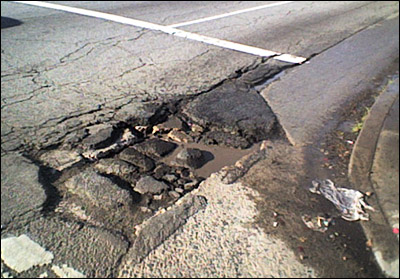 This grim deathtrap is not by any means the worst pothole in Los Angeles; indeed it is rather moderate as those things go. I note it only because it is by a corner that I pass several times a week, to be specific, the northwest corner of Beverly Boulevard and Arden Street, a block from hip 'n' ritzy Larchmont Village and another block from the house where I grew up (well before Larchmont was hip).
This grim deathtrap is not by any means the worst pothole in Los Angeles; indeed it is rather moderate as those things go. I note it only because it is by a corner that I pass several times a week, to be specific, the northwest corner of Beverly Boulevard and Arden Street, a block from hip 'n' ritzy Larchmont Village and another block from the house where I grew up (well before Larchmont was hip).It's also a corner where a bike route (Arden) intersects a major arterial (Beverly) often used by cyclists. I've ridden over it myself many dozens of times--gingerly, of course.
Anyway, it is average enough to serve as a symbol of what we have to put up here as cyclists in LA--of what everyone has to put up with, regardless of mode of travel.
Indeed, it even manages to block the crosswalk!
I very much hope your town does better. Meanwhile, I'll go once more to the Bureau of Street Services website and report it--for about the third time.
Usually they fix a pothole within two weeks, but this one requires a bit more work than most. And scheduling a repair on an incessantly busy street isn't easy...especially with no money in the budget.
Sprawl, car worship, bigbox blandishments, Prop. 13. Stupid, wasn't it? We really fell for it....
I'm glad it's starting to change. I wish it were changing faster. But for now, this is what we live with in LA.
Richard Risemberg on Thu, 11 Feb 2010 14:39:51 -0800 [link]
Regular readers will recall that we were surprised by a delay in production, after we had begun accepting pre-orders. So we reset the expected shipping date (now February 20th), and then begged a small accelerated run of knickers to ship to those who had ordered on the presumption that we would be able to ship around February 7th, as we'd originally hoped.
Well, we picked them up yesterday, and shipped them today--but took a moment to photograph a leg wearing said knickers, to give you a better idea of the color. (Or at least as good an idea as you'll get from a computer monitor.)
So if you're thinking of knickers, take a look. The new photo is number 5, the last one in the row of thumbnails.
There you have it!
(By the way, the leg was mine, and the new wool feels really very nice....)
Richard Risemberg on Wed, 10 Feb 2010 18:08:32 -0800 [link]
By the time I left the factory, it was raining steadily but gently, one of my favorite weathers. Clad all in wool as I was, I could forego donning the rain cape and just pedal along, barely feeling the wetness though the streets were soaked.
If it's not raining hard, and you're wearing wool, you often reach an equilibrium, where the speed of your ride and the heat of your pedaling evaporate the water from your clothes at the same rate that it is falling on you. And wool keeps you warm even if it does get wet. The rain was such that I was at this state of equilibrium most of the time.
And the day was beautiful, with tumultuous rich gray clouds above and skylight gleaming from wet streets and windows underneath. I made it to Buster's coffee in thoroughly presentable condition.
When it was time to leave, I looked southwest and saw from the sky that it was likely raining between South Pasadena and downtown. Since the messenger bag full of knickers on my back would make the rain cape fit wrong, I took out my last $1.25 and got on the Gold Line train to Union Station. Downtown, as I'd expected, it was raining lightly again, and I had another wonderful passage among the crowds and elegant old Art Deco buildings of the jewelry and garment districts. I was gratified to see lots of folks on bikes in the rain; not just messengers and food delivery riders, who have no choice, but regular folks apparently heading out to lunch (it was just after twelve). Many of them on fixies, which make great rain bikes. (As was I.)
From there I rode down 7th and 6th streets through Koreatown and then home. It started raining hard a little less than a mile from home, but by then I didn't care, and left the rain cape in its pannier. Thanks to wool, I was still presentable when I got home, even by Gina's standards, which I admit are more stringent than my own.
Great stuff, that sheep hair. Made for a delightful ride today!
Richard Risemberg on Tue, 09 Feb 2010 20:29:52 -0800 [link]
Yes, it's nothing but normal...how different from here in the US--for now!
Oh...and you don't call in "winter" without more snow? Then click here.
Richard Risemberg on Fri, 05 Feb 2010 17:34:09 -0800 [link]
This time I rode Trevor, the Pseudobecane, primarily because his fork-mounted headlamp would not be blocked when I used the rain cape properly, that is, draped over the handlebars. As in fact I did, as you can see from the photo Gina took of me as I came home:
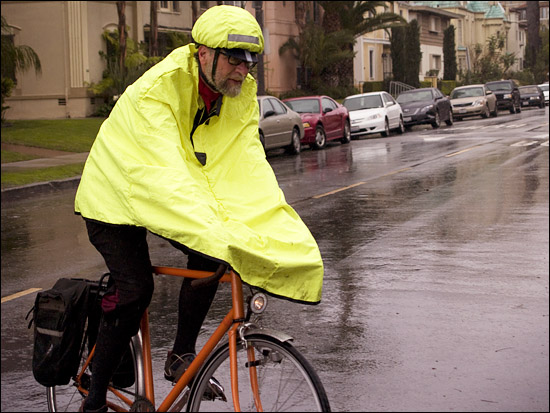
What surprised me in particular today was--well, it was two related things:
- How many people of all economic classes were riding their bicycles on a cold, very wet, and wildly windy day; and
- How few of them wore any raingear at all!
Ah, well, it will likely remain a mystery, as we haven't the means to support a large-scale survey of inclement-weather sartorialism in Southern California...but I can't help wishing they'd get a clue.
I shouldn't complain anyway: I myself should have had rain spats on, as I did get wet from the shins down, but just didn't care.
At least they were out there, riding, and looking not at all unhappy. LA growing up.
Richard Risemberg on Fri, 05 Feb 2010 13:26:59 -0800 [link]
In the morning I rode to B. Black & Sons, where I buy wool, ordered up a hundred yards or so of sheep hair, and then borrowed their immense handcart--nearly as big as a station cart--so I could push it along the teeming sidewalks to the factory.
By the time I got the cart back I had to leave for South Pasadena, which was a nice ride and a nice visit both--and then it was back to downtown for fusing and elastic. Zip-Up was out of the size of elastic I needed, so they called it in from another store; while I waited for it to arrive I walked over to Moon for the fusing and hoisted it back to Zip-Up on my shoulder. (This time I'd left my bike at the factory; the garment district is small, and it's often easier just to hoof it, which I enjoy anyway.)
A little after I returned to Zip-Up, the elastic arrived--by bicycle! Reminding me that sometimes, some places, the world we look forward to in these pages is already thriving.
Hoisted the roll of fusing and the bags of elastic and hoofed it back to the factory, where I retrieved my bike (it was Trevor's turn for an outing today, and rode home at last (though not without yet another stop on the way).
Keep an eye on these pages, especially if you're from Portland; once these special edition long cycling pants are on sale up there, we'll let you know!
And, oh, yeah: the next batch of BF knickers is a-sewing up right now, and should be done in three weeks or so. You can pre-order here.
Richard Risemberg on Tue, 02 Feb 2010 20:29:33 -0800 [link]
If it were possible to sum up the lessons from the scan study in one sentence, it would be this: To increase safety and mobility for walkers and bicyclists, a country must embrace foot and bicycle traffic as transportation modes and consider them as a means to attaining livability and sustainability goals.The entire report is clear, concise, readable, and well worth reading, and I highly recommend it. So here it is: Handy Lessons from Overseas on Walking and Bicycling
[Photo caption:] In all the countries the scan team visited, parking lots for bicycles are common and sometimes large, as in this lot at a transit station in Lund, Sweden.
Variations on this concept played out in each country the scan team visited. In Switzerland, transportation policy puts human-powered mobility on a par with motor vehicles and transit. In Germany, bicycles are permitted on transit with no exceptions--that is, on all trains. In contrast, many transit systems in the United States prohibit bicycles on board trains at rush hour. Many of the countries invest significant funds in bicycling facilities. They set ambitious targets for mode shifts at both the national and local levels, even for communities that already have substantial bicycling rates.
Maybe a little bit of all that hope and change stuff is really happening after all....
Richard Risemberg on Mon, 01 Feb 2010 19:43:09 -0800 [link]
